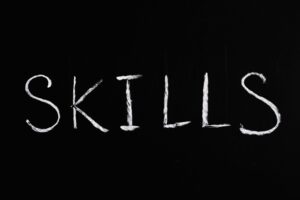Switching careers is something that happens in just about every industry. No matter where you get your start, you can always try something different. But let’s face it, making that change can feel pretty tough.
Yet, a career shift may be the one thing holding you back from achieving greater job satisfaction. Your current job may be holding you back more than you realize.
That’s why we’ve put together this article—to walk you through the steps you need to know when thinking about changing your career. We’ll also discuss how certain skills you already have can be super useful in a whole new field.
So, whether you’re eyeing a different industry altogether or just want to switch up your job role, we’ve got your back.
Let’s dive into the nitty-gritty of making a career change like a pro.
Decide if You Want to Change Industries or Roles
First things first, you need to figure out whether you’re looking to jump ship to a completely new industry or if it’s just a new job role that you’re looking for.
For instance, if you’re currently doing sales in the pharmacy world, you might be thinking about trying your hand at IT sales. And guess what? That’s totally doable!
You don’t always have to make a gigantic leap. Sometimes, roles in other industries can offer greater benefits.
The bottom line is whatever you decide, it’s all about finding that sweet spot where your interests, skills, and opportunities align. But it’s a good idea to ensure that it aligns with your goals. This brings us nicely into the next section.
What are your goals?

Before you dive headfirst into changing careers, take a moment to figure out what’s driving you.
Are you looking for a fatter paycheck?
Or, more chances to develop your skills?
Or the excitement of trying something brand new?
Your goals need to align with this career change idea.
So, before you go all in, make sure your goals and your career switch are in perfect alignment. Or, you may regret it later.
Now that we’ve got your goals in order let’s see what careers you can start applying for.
Brainstorm careers
Now, it’s time to start exploring potential career paths. This step is all about finding out what options are out there for you.
Let’s say you’re a pro at sales. Well, that’s a skill that can be pretty handy in various fields. Whether it’s healthcare, technology, or education, your knack for sales could land you a fantastic new job.
And don’t forget those technical skills you’ve picked up along the way. Whether you’re a spreadsheet master or skilled in coding, these abilities can open doors to roles you might not have considered.
Your soft skills are valuable, too—things like communication, problem-solving, and teamwork. They’re the building blocks of a successful career, regardless of the industry.
Let’s give an example.
If you’ve been a restaurant manager, you may be suitable for roles such as:
An Event Coordinator, a Retail Store Manager, or even a Business Consultant.
Why?
Because there are plenty of transferable skills, such as:
- Customer service skills
- Leadership skills
- Ability to handle customer interactions
- Operations experience
- Consumer trends analysis
- Boosting customer satisfaction
- Cost management experience.
See, it’s all about using existing skills to support a new position. Do you get the drift?
Take stock of skills.

Now that we’ve explored potential career avenues let’s shift our focus to your skill set. Think of this step as a self-assessment—Take stock of the skills you currently have and identify the ones you need to work on for a successful career change.
Start by reflecting on your transferable skills. These are the skills that will be applicable to your future career.
Look at both soft skills and technical skills. Soft skills are things like problem-solving and communication skills. While technical skills are more industry-specific, like being able to use certain software.
You may also have benefited from professional development courses in the past. This could have been online courses, attending workshops, or even an advanced degree. Don’t forget to consider how these experiences can benefit you during your career switch.
So, recognize your strengths, acknowledge areas for growth, and lay out a plan to develop the skills that will make your career transition successful.
Consider additional education

If you’re eyeing a career change that requires a new skill set or more in-depth knowledge, don’t be afraid to explore educational resources. It might mean going back to school for a formal degree, or it could be as simple as taking e-learning courses online.
Whatever the case, this is an investment in yourself. So don’t see it as a burden and try to enjoy the experiences as much as you can.
Start the job hunt.

Utilize Your Professional Network
As the saying goes, your network is your net worth. It’s a tool that can be really useful in your career change journey. Tap into your professional connections, both old and new. Reach out to colleagues, mentors, and even friends who might be in the industry you’re eyeing.
Ask them if you can conduct informational interviews. These are basically casual chats where you pick someone’s brain about their career path and industry insights. They can provide you with a wealth of information, from the day-to-day realities of the job to the skills that are highly valued.
If you have a limited professional network, employ the help of career services. They may be able to offer insight or contacts that you can use to learn more about job roles that may be available.
Job Search
Now, let’s talk about job hunting. Start your search with online listings. Take a look at what requirements are being set. Before you apply, ensure your cover letter and resume include those skills.
Entry level positions may offer the best way for career changers to get their foot into a new industry. Conduct some market research to determine how much the average salaries are for those types of roles. (P.s. You can do that through our site.)
Interview
When you land those interviews, it’s your time to shine. Prepare by having a compelling story about your career change journey. Embrace your uniqueness—your different background might just be what sets you apart from other job candidates.
Lean on your existing knowledge and experience. Remember, even if it’s from a different field, skills like problem-solving, communication, and teamwork are universally valuable. Show how they make you an asset to your potential new employer.
You may need to have your negotiation skills on hand to ensure you can convince the hiring manager of your abilities.
This is your chance to showcase your adaptability and eagerness to learn. So, whether you’re in a virtual interview or a face-to-face meeting, rock that interview with confidence and let your enthusiasm shine through.
Bottom Line
And there you have it—the comprehensive guide to mastering a successful career change. We’ve covered the essential steps, from deciding your direction to honing your skills and even acing the application process.
Feel free to check out the rest of our site for more content on the world of employment.
FAQ
Is it okay to change career at 30?
Absolutely, it’s never too late to change careers at 30. Many people make successful career changes at this age and find new opportunities that align better with their interests and goals.
How do I change my career path with no experience?
Changing career paths with no experience requires careful planning. Start by identifying transferable skills from your current role, then volunteer or freelance in your desired field to gain experience and network within that industry. All the while, keep applying for roles that become available.
Can you change jobs at 35 with no degree?
Yes, you can change jobs at 35 without a degree. Many industries value skills and experience over formal education. Focus on showcasing your relevant skills, accomplishments, and willingness to learn in your job application and interviews. This can sometimes even paint you as a more unique candidate.
Is it too late to switch careers at 35?
No, it’s not too late to switch careers at 35. Many people change careers in their mid-30s and beyond.
How do I start a career change at 40?
To start a career change at 40, assess your goals and what skills you have available. Research potential careers, gain relevant skills through courses or training, update your resume to highlight transferable skills, and network within your desired industry.
How to change careers when you don’t know what you want to do?
If you’re uncertain about your new career direction, consider taking career assessment tests and seeking guidance from career counselors and career services. Also, talk to professionals in other fields and try out different roles through internships or part-time work to explore your interests.
How do I transition from one job to another?
Transitioning from one job to another involves careful planning. Update your resume, tailor your cover letter, highlight transferable skills, network with professionals in your desired industry, and prepare for interviews by showcasing how your existing skills can benefit your new role.
How common is it to switch careers?
Career switching has become more common due to evolving industries and changing work environments. Many people switch careers multiple times throughout their working lives to pursue new challenges and opportunities.

